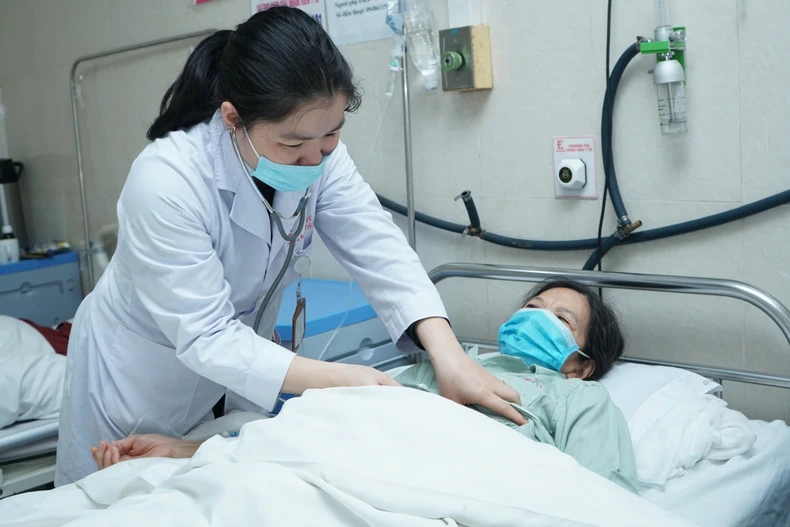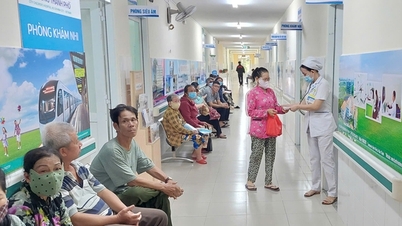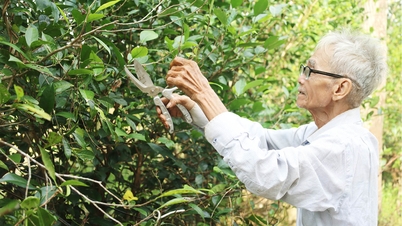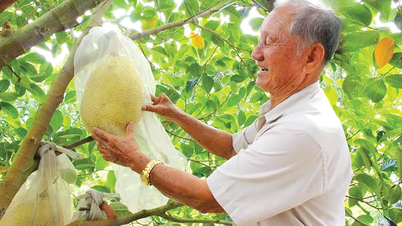NDO - After testing positive for the flu at home, the patient took Tamiflu for 2 days. However, the patient still had a high fever and fatigue, so he had to go to the Tropical Diseases Department, E Hospital, with a secondary influenza B infection.
Flu cases continue to increase
Patient NTT (female, 73 years old, in Hanoi ) was admitted to the hospital with a persistent high fever, cough with phlegm, sore throat and fatigue. Four days before, the patient had flu symptoms but bought medicine on her own instead of going to the doctor. When the condition worsened, the patient went to E Hospital for examination and was diagnosed with influenza A infection. At the hospital, the patient was treated with antibiotics, anti-influenza virus combined with supportive measures such as cough relief, fever reduction and electrolyte replacement.
Not only the elderly or people with underlying diseases, flu can also cause dangerous complications in healthy young people. The case of patient NNP (female, 30 years old, Hanoi) is an example. Four days before being hospitalized, the patient had a high fever with headache, sore throat, cough with phlegm, runny nose, and body aches. After testing positive for flu at home, the patient took Tamiflu for two days.
However, the patient's high fever and fatigue forced him to visit the Tropical Diseases Department, E Hospital. Here, the patient was diagnosed with influenza B and was prescribed antibiotics, antivirals, and supportive measures such as cough relief, fever reduction, and electrolyte replacement.
This case shows that even young people with a history of good health should not be subjective with the flu, especially when the disease progresses for a long time or shows unusual signs.
The above two cases are just some of many flu cases being treated at the Tropical Diseases Department, E Hospital.
Master, Doctor Dinh Thi Bich Thuc - Department of Tropical Diseases said that according to statistics from January 2025, the Department of Tropical Diseases has received and treated about 250 cases of influenza of all kinds. However, after the Lunar New Year 2025, the number of influenza cases coming for examination and treatment tends to increase, with an average of about 10 patients with influenza per day.
At peak times, there are days when doctors at the Tropical Diseases Department examine nearly 40 patients, of which more than half have the flu.
Notably, not only the elderly, children or people with underlying diseases (cardiovascular, diabetes, respiratory ...) but also young, healthy people are at risk of getting sick and experiencing complications if they are subjective. Currently, the Tropical Diseases Department is receiving and treating more than 20 patients with various types of flu.
According to information from the Ministry of Health , in Vietnam, the number of flu cases will increase locally from the end of 2024 and during the Lunar New Year 2025, but there will be no mutations compared to previous years. Common influenza virus strains include: influenza A/H3N2, A/H1N1 and influenza B. Currently, the winter-spring weather with high humidity creates favorable conditions for the virus to develop and spread. At the same time, the increased demand for travel, trade and festival activities at the beginning of the year also increases the risk of disease outbreaks...
Be careful when treating flu at home
Dr. Thuc emphasized that anyone is at risk of getting the flu, but the level of impact will vary depending on each subject. Although many cases of flu can recover on their own, if not treated promptly, the disease can progress severely, causing dangerous complications such as pneumonia, respiratory failure, bacterial superinfection, and even life-threatening in severe cases.
 |
Flu patients need to monitor symptoms to go to medical facilities promptly. |
According to Dr. Le Quoc Hung, Head of the Department of Tropical Diseases, Cho Ray Hospital, most cases of seasonal flu do not require specific medication (antiviral drugs), because the body can produce antibodies against the virus in about 5-7 days. Early supportive treatments should be used to reduce symptoms such as paracetamol to reduce fever and pain. Antihistamines to prevent runny nose. Codeine-based cough suppressants or dextromethorphan (only used when there is a severe dry cough, chest pain) or some herbal cough medicines. And high doses of vitamin C.
Traditional methods such as full body steaming and nasal steaming are also effective in quickly reducing symptoms. In addition, it is necessary to ensure a nutritious diet (especially vegetables and fruits), drink plenty of water, rest, avoid overwork, and keep the body warm (especially the throat and at night).
Dr. Hung especially noted that antiviral drugs are only used for people at high risk or with severe disease progression. In particular, each type of antiviral drug usually only works on certain viruses. Therefore, it should only be used when there is a test to determine the strain of virus causing the disease.
"Oseltamivir (Tamiflu) antiviral drugs only work on influenza A virus, so if you have acute respiratory infections caused by influenza B, C or not influenza virus, it will have no effect at all," said Dr. Hung.
Several other antiviral drugs currently on the market have similar effects on a number of other selective viral agents. This proves that people should not self-medicate with antiviral drugs because the benefits are lower than the effectiveness and sometimes they are disadvantaged by the harmful effects of the drugs.
Doctors warn that people at high risk of dangerous complications from seasonal flu include: Pregnant women at any stage of pregnancy; Children under 5 years old; People over 65 years old; People with chronic diseases such as HIV/AIDS, asthma, heart disease, lung disease and diabetes; People at high risk of flu exposure, including health care workers.
To prevent seasonal flu, the Steering Committee for Disease Prevention and Control of E Hospital recommends that people should: Cover their mouth and nose when coughing or sneezing, preferably with a cloth or handkerchief or disposable tissue or sleeve to reduce the spread of respiratory secretions; Wear a mask in crowded places, on public transport; Regularly wash hands with soap and clean water or hand sanitizer (especially after coughing or sneezing); Do not spit indiscriminately in public places; Limit contact with people with flu or suspected cases when not necessary; Get vaccinated against seasonal flu; Practice a healthy lifestyle; eat nutritious foods to prevent influenza virus infection; increase physical activity to improve health.
Source: https://nhandan.vn/nguoi-tre-cung-de-gap-bien-chung-do-cum-neu-chu-quan-post860300.html



![[Photo] Parade to celebrate the 50th anniversary of Laos' National Day](/_next/image?url=https%3A%2F%2Fvphoto.vietnam.vn%2Fthumb%2F1200x675%2Fvietnam%2Fresource%2FIMAGE%2F2025%2F12%2F02%2F1764691918289_ndo_br_0-jpg.webp&w=3840&q=75)

![[Photo] Worshiping the Tuyet Son statue - a nearly 400-year-old treasure at Keo Pagoda](/_next/image?url=https%3A%2F%2Fvphoto.vietnam.vn%2Fthumb%2F1200x675%2Fvietnam%2Fresource%2FIMAGE%2F2025%2F12%2F02%2F1764679323086_ndo_br_tempimageomw0hi-4884-jpg.webp&w=3840&q=75)



































































































Comment (0)